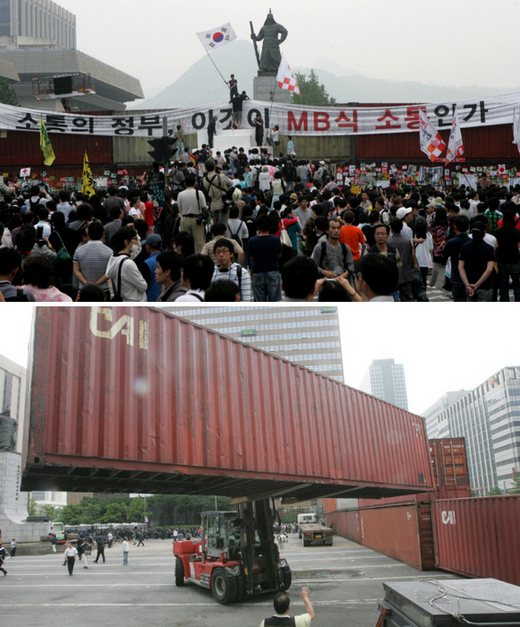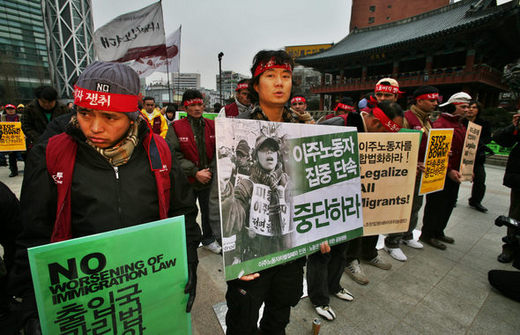The MTU is courageous, but it seems that the frequency with which the government is attacking their leadership is frightening: three sets of leaders in 6 months. The new government seems to have sped up the political repression against politicized migrants even faster than the previous one.
KCTU - Repression against the Migrant Trade Union leadership continues
Repression against MTU Leadership Continues!
The South Korean government has attacked MTU (Seoul-Gyeonggi-Incheon Migrants’ Trade Union) once again. On May 2, only one day after workers around the world celebrated May Day, MTU's newly elected president and vice president were forcibly arrested by immigration officers, the president in front of the union office and the vice president at his home. We are deeply enraged by this act of repression against MTU and migrant workers' organizing in South Korea!
Description of the Incident
At roughly 8:20pm on the night of May 2, President Torna Limbu and MTU's vice general secretary were walking out of the MTU office when they were suddenly confronted by 10 to 15 immigration officers who were waiting hidden around the corner. The officers surrounded the president and without presenting a detention order violently forced him into a van waiting nearby. When the vice general secretary attempted to protest he was physically restrained by officers who shouted at him not to interfere with public affairs.
Soon after, at around 9:00pm the same night, union officers become unable to contact MTU Vice President Abdus Sabur. When a union officer and a Korean supporter went to check on him, they found his house empty. A neighbor informed them that immigration officers had been their shortly before. At 12:30am it was confirmed that the vice president had also been arrested and that both men were being transported to Cheongju Detention Center 2.5 hours south of Seoul.
The arrests of both MTU leaders were clearly pre-planned. Immigration officers had followed the president since the previous day when he participated in May Day activities. The vice president recognized a person who had sat nearby him at a fundraiser the week before among the officers who arrested him. That President Torna heard the officers in the van carrying him communicating consistently with those stationed near Vice President Sabur’s house and in other areas in Seoul also shows clearly that the arrests were coordinate with one another.
Long-term Attack on MTU
This outrageous act of repression comes only several months after the targeted crackdown against MTU leadership on November 27 of last year in which the former president, vice president and general secretary were all arrested. In the wake of that attack MTU, the Korean Confederation of Trade Unions and supporters from the labor movement and civil society carried out a 99-day sit-in protest calling for an end to the oppression against migrants and migrant organizing and at the same time rebuilt MTU. On April 6, MTU elected a new leadership, with President Torna at the forefront, and moved forward determined to fight the crackdown against undocumented migrant workers and win migrant workers' labor and human rights.
The new conservative government of Lee Myeong-bak, however, has only strengthened the policy of repression against migrant workers. A mass crackdown against undocumented migrant workers has again begun and Lee Myeong-bak has stated that he will not tolerate undocumented migrant workers' unionizing.
Supreme Court Case
Lee Myeongbak’s statement is a direct reflection of the attitude the South Korean government has taken towards MTU since its founding in 2005. At that time the Ministry of Labor rejected MTU’s official union status, claiming that undocumented migrant workers do not have the right to freedom of association and union activities. MTU carried out a legal battle against this decision and eventually won in the Seoul High Court on 1 February 2007. However this verdict was appealed to the Supreme Court, where a decision is expected to be reached by the middle to end of this year. The Ministry of Labor bases its appeal on the claims that the right of undocumented migrant workers to freedom of association is not protected in the South Korean Constitution or stated clearly in international law. However, we know that workers are workers, entitled to the same labor rights, no matter what country they reside in under what visa status. This was clearly shown in the High Court decision, which ruled that undocumented migrant workers are the subjects of equal labor rights under South Korean law and in rulings of the ILO Committee on Freedom of Association (UGT [2001], AFL-CTM [2002]) and the Inter-America Court of Human Rights (17 Sept. 2003), which show that international law protects the union rights of undocumented migrant workers.
Stop the Repression!
The arrests of President Torna, Vice President Sabur and previous union leadership, and the South Korean government’s refusal to recognize MTU’s legal union status are clearly an attempt to break MTU's opposition to oppressive policies towards migrant workers. This repression is not only against MTU, but against migrant workers’ organizing in general and, indeed, the entire labor movement.
Despite the attacks, MTU stands unwaivering in our opposition to the crackdown against undocumented migrant workers and in our position that migrant workers, regardless of their visa status, are entitled to equal labor and human rights. We therefore make the following demands:
1. Stop the repression against MTU and release President Torna Limbu and Vice President Abdus Sabur immediately!
2. In the name of the right to freedom of association of all workers, recognize MTU’s legal union status!
3. Stop the crackdown against legalize all undocumented migrant workers!
Call for Solidarity
Ours is a fight not only for migrant workers in South Korea but for migrant workers all over the world. Therefore, once more, we ask for your support. Please show your solidarity in the following ways.
1. Organize a solidarity protest in front of the South Korean embassy or consulate in your area.
2. Send a protest letter in your organization’s name to the South Korean Ministry of Justice and Commissioner of Korea Immigration Service. (See the example letter below, please send to all the fax numbers given)
3. Encourage your members and networks to sign the online petition at this link: http://www.ipetitions.com/petition/StopMigrantRepression/.
4. Please send us a copy of protest letter and a word of any actions you take and pictures if possible. inter@kctu.org , mtuintl@jinbo.net
Let’s struggle together for the rights of all workers!
Seoul-Gyeonggi-Incheon Migrants Trade Union
Korean Confederation of Trade Unions
--------------------
Sample Protest Letter
Ministry of Justice, Republic of Korea
Building 1, Gwacheon Government Complex,
Jungang-dong 1, Gwacheon-si, Gyeonggi-do
Republic of Korea
Fax: 82-2-2110-3079
Commissioner of Korean Immigration Service
Fax: 82-2-500-9059, 82-2-500-9128, 82-2-500-9026
To the South Korean Minister of Justice Kim Gyeong-han:
We, the ___________(organization’s name), write to express grave concern and outrage at the recent arrests of the President and Vice President of the Seoul-Gyeonggi-Incheon Migrants’ Trade Union (MTU). We see this attack as an assault not only against MTU but against the migrant workers movement and labor movement worldwide.
On the evening of May 2, only one day after May Day, MTU President Torna Limbu and Vice President Abdus Sabur, were arrested at separate places between 8:20 and 9:20pm. The President was coming out of the MTU office with the MTU Vice General Secretary when they were suddenly confronted by 10 to 15 immigration officers who were waiting hidden around the corner. The officers surrounded the president and without presenting a detention order violently forced him into a van waiting nearby. When the vice general secretary attempted to protest he was physically restrained by officers who shouted at him not to interfere with public affairs.
Soon after, 10 to 15 immigration officers banged on door of Vice President Sabur’s residence, entered and forcibly arrested him. Both men were transported that night to Cheongju Detention Center 2.5 hours south of Seoul. These arrests were clearly preplanned and carefully carried out in an attempt to stop MTU’s rightful union activities. Even more maddening, they come only several months of a similar attack against MTU’s leadership in which the previous president, vice president and general secretary were arrested and later deported at the end of last year.
We are aware that this targeted crackdown against MTU’s leadership coincides with the pending Supreme Court Case concerning MTU’s legal union status. We are concerned that despite a Seoul High Court Ruling on 1 February 2007 in favor of MTU, the Supreme Court decision, most likely to come out in the middle or end of this year, may deny South Korean migrant workers’ right to freedom of association, in contradiction with South Korean and International Law. We wish to assert that all workers, regardless of their visa status or the country in which they reside, are entitled to equal labor rights, including the right to form and participate in trade unions.
The arrests of President Torna, Vice President Sabur and previous union leadership, and the South Korean government’s refusal to recognize MTU’s legal union status are clearly an attempt to break MTU's opposition oppressive policies towards migrant workers. We see this not only as repression against MTU, but as repression against migrant workers’ organizing and the labor movement worldwide.
We therefore make of you the following demands:
1. Stop the repression against MTU and release President Torna Limbu and Vice President Abdus Sabur immediately!
2. In the name of the right to freedom of association of all workers, recognize MTU’s legal union status!
3. Stop the crackdown against legalize all undocumented migrant workers!
Sincerely,
___________________
(name, title, organization)
Lee Changgeun
International Executive Director
Korean Confederation of Trade Unions
Tel.: +82-2-2670-9234 Fax: +82-2-2635-1134
E-mail: inter@kctu.org Web-site : http://kctu.org
2nd Fl. Daeyoung Bld., 139 Youngdeungpo-2-ga, Youngdeungpo-ku, Seoul 150-032 Korea
























